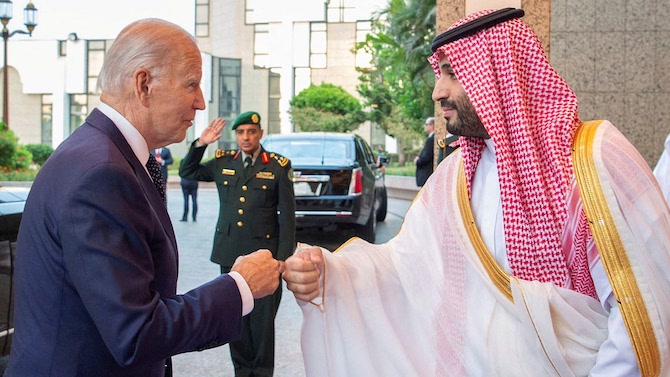by Yanis E. Makhlouf

The recent visit of the US president to Saudi Arabia and his cold reception by the Crown Prince is only one sign of the weakening of America’s position in the Middle East. The superpower has been and is seemingly losing the favours of many of its allies.
The 2020 presidential election was one fought with powerful contrast and won with the idea that competence, professionalism, and personnel discipline would return to the White House after the rather chaotic governance style of the Trump years.
However, it seems clear now that the present administration is much more despised in the halls of Middle Eastern foreign ministries than the previous one. The Trump administration with its stalwart support of Israel and generous hand towards the Saudis was viewed very favourably by Gulf monarchies. Its hawkish rhetoric towards Iran, bordering on recklessness, has at times ended the prospects of a nuclear deal but arguably reinforced ties with allies opposed to it like Israel or Saudi Arabia. The Biden administration has so far neither succeeded in reviving the 2015 Vienna Accords with Iran nor restored its standing with the emirs, princes, sheikhs, and oil barons of the Gulf.
The recent moves made with the visit to both Israel and Saudi Arabia by President Joe Biden have been perceived as humiliating for America. The president who had decried the Crown Prince, Mohammed Ben Salman, and his state as a “pariah”, was forced to figuratively bow down in front of him for oil. Gas prices and pragmatism has shifted the human rights-based foreign policy approach of the Democratic administration to the dismay of much of the progressive wing of the party.
However, the burned bridges have deeper roots. Since August 2021 and the withdrawal from Afghanistan that resulted in the Taliban taking over, the Biden administration has been perceived as unreliable and unwilling to project power. The balance between showing strength and reckless interventionism is thin, especially in such a geopolitically unstable region of the globe.
In the ruling circles of Saudi Arabia and the United Arab Emirates, two close American allies, the US government and more precisely the current administration is no longer seen as the privileged interlocutor among Western powers. Mohammed Ben Zayed, the new president of the UAE and de facto ruler since 2014 has chosen France for his first state visit, while MBS, leader of the Saudis has made an official visit to France right after.
The White House seems to be adrift amidst domestic unrest and challenges on the world stage. While America’s primacy in the Middle East in the long-term is not challenged, its short and medium-term diplomatic standing has been damaged. One of the many consequences of a deepening American malaise with profound geopolitical consequences.
Many new agreements of cooperation have been signed on the occasion of Biden’s visit, however, the overall perception of it within America’s ruling circles remains bitter. The 180° shift from Biden’s supposed tough stance on autocracy has been swept away by the need to get prices down at the pump with elections right around the corner. Voters do not care much about what is done, as long as the gas flows at a reasonable price that will not crush America’s working and middle classes.
To fill the void, regional powers like Turkey are stepping up their diplomatic efforts, especially in light of the war in Ukraine. Similarly, the US seems increasingly set aside the Syrian situation. Bashar Al-Assad’s visit to the UAE a few months ago, the first to any Arab state since the start of the Syrian civil war was a major development from which the US seemed rather absent apart from some diplomatic objections towards its Emirati ally.
The dynamics of the region have changed greatly in the past twenty years and though America’s presence especially militarily has been considerably reduced, American leadership is still needed. The War in Syria is a case in point with the question of America’s support for the Kurds in the northeast of the country. Leaving the issue unresolved and the Kurds to their fate do not seem like a good solution. It could incite Turkey to engage in further advances in the Syrian north, which in turn, could stoke great tensions with the Al-Assad clan, the Russians and Iranians.
It is time for the current administration to recognise that it has a Middle East problem and address the failures of its foreign policy. Not doing so could leave a dangerous opening to other powers like China or Russia that will do their utmost to court America’s Middle Eastern partners to gain their good graces and snatch them away from the US’ sphere of influence.







3 Comments